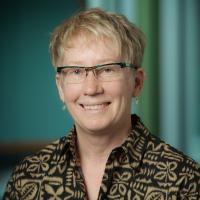Susan B. Boyd, F.R.S.C.
Professor Emerita
Fellow of the Royal Society of Canada
B.A. Bishop's University 1975; LL.B. McGill University 1978; LL.M. University of London 1982; D.E.I. University of Amsterdam, 1979; F.R.S.C.
- Email: boyd@allard.ubc.ca
Profile
Susan B. Boyd joined the Allard School of Law in 1992. She taught previously at Carleton University's Department of Law in Ottawa. At UBC, she held the endowed research Chair in Feminist Legal Studies from 1992 to 2015. She was the founding Director of the Centre for Feminist Legal Studies from 2007 to 2012. She retired on June 30, 2015 but continues her relationship with UBC as Professor Emerita.
History Project - an audio interview with Professor Emerita Susan Boyd
Professor Boyd researches and publishes on feminist legal theory, and gender and sexuality issues in the fields of family law, especially child custody and parenthood law. In 2007, she co-edited Reaction and Resistance: Feminism, Law, and Social Change and Poverty: Rights, Social Citizenship and Legal Activism. Law and Families appeared in 2006. Her book Child Custody, Law, and Women's Work was published in 2003. Canadian Feminist Literature on Law: An Annotated Bibliography appeared in 1999. Challenging the Public/Private Divide: Feminism, Law, and Public Policy was published in 1997. Her latest book (2015) is Autonomous Motherhood? A Socio-Legal Study of Choice and Constraint, which addresses legal parenthood and the possibilities for autonomous motherhood.
Professor Boyd was a long-standing member of the editorial board of the Canadian Journal of Women and the Law and was on several other editorial or advisory boards. She also worked for law reform in the family law field and supported organizations that work for social change for women, such as the National Association of Women and the Law and the Women’s Legal Education and Action Fund.
In 2012, Professor Boyd was elected a Fellow of the Royal Society of Canada, the highest honour a scholar can achieve in the Arts, Humanities and Sciences, in recognition of her international reputation as a leading socio-legal scholar who has made exceptional contributions to family law and feminist legal studies. Other awards include a Faculty Scholar Award (2010) and an Alumni Award for Research (2008).
Research and Publications
To learn more about my research, please visit my PURE Research profile. You can also access my works on the following sites:
Publications
- Elizabeth Sheehy & Susan B. Boyd, “Penalizing women’s fear: intimate partner violence and parental alienation in Canadian child custody cases, (2020) 42:1 Journal of Social Welfare and Family Law, 80-91.
- “Looking Back, Looking Forward: Feminist Legal Scholarship in SLS” (2017) 26(6) Social & Legal Studies 735-756 (with Debra Parkes).
- “Intersecting Challenges: Mothers and Child Protection Law in BC” (2017) 50:2 UBC L Rev 435-504 (with Judith Mosoff, Isabel Grant, and Ruben Lindy).
- “Violence Against Women and the B.C. Family Law Act: Early Jurisprudence” (2016) 35(2) Canadian Family Law Quarterly 101-138 (with Ruben Lindy).
- “‘Race is Not a Determinative Factor’: Mixed Race Children and Child Custody Cases in Canada” (2015) 29(2)Canadian Journal of Family Law 309-380 (with Krisha Dhaliwal).
- Autonomous Motherhood? A Socio-Legal Study of Choice and Constraint (University of Toronto Press, 2015) (with D Chunn, F Kelly and W Wiegers)
- “Family Law Reform in (Neoliberal) Context: British Columbia's New Family Law Act”, (2014) 28:1 International Journal of Law, Policy and the Family 77-99 (with R. Treloar).
- “‘Marriage is More Than Just a Piece of Paper’: Feminist Critiques of Same Sex Marriage.” (2013) 8(2) National Taiwan University Law Review 263-298
- "Still Gendered after all this Time? Care and Autonomy in Child Custody Debates" in N Priaulx and A Wrigley, eds., Ethics, Law, and Society vol V: Ethics of Care, Body Politics, Theorising the Ethical and Governance (Ashgate, 2012), 69-90.
- "Spaces and Challenges: Feminism in Legal Academia" (2011) 44(1) UBC Law Review 205-220
- "Relocation, indeterminacy, and burden of proof: lessons from Canada" (2011) 23(2) Child and Family Law Qtly 155-177.
- "Joint Custody and Guardianship in the British Columbia Courts: Not a Cautious Approach" (2010) 29 Canadian Family Law Quarterly 223-252.
- "Autonomy for Mothers? Relational Theory and Parenting Apart" (2010) 18(2) Feminist Legal Studies 137-158.
- "Is Equality Enough? Fathers' Rights and Women's Rights Advocacy." In Rethinking Equality Projects in Law: Feminist Challenges, edited by Rosemary Hunter, 59-79. Oxford: Hart Publishing, 2008, Onati International Series in Law and Society.
- Reaction and Resistance: Feminism, Law, and Social Change (with D. Chunn and H. Lessard)
- "Gendering Legal Parenthood: Bio-Genetic Ties, Intentionality and Responsibility." (2007) 25 Windsor Yearbook of Access to Justice 55-85.
- "Losing the Feminist Voice? Debates on the Legal Recognition of Same Sex Partnerships in Canada." (2006) 14 Feminist Legal Studies 213-240 (with C. Young).
- Law and Families, International Library of Essays in Law and Society (edited with H. Rhoades) (Ashgate 2006)
- Child Custody, Law, and Women's Work (Toronto: Oxford University Press, 2003)
- "Canadian Feminist Literature on Law: An Annotated Bibliography", (1999) 11 Canadian Journal of Women and the Law.
- Challenging the Public/Private Divide: Feminism, Law, and Public Policy (University of Toronto Press, 1997).
- "Who Influences Family Law Reform? Discourses on Motherhood and Fatherhood in Legislative Reform Debates in Canada" (2002) 26 Studies in Law, Politics, and Society 43-75 (with C. Young)
Publications listed on the Allard Research Portal.

Research Interests
- Family Law
- Feminist legal studies
- Law and social justice
- Law, gender and sexuality
How can law be used to address the systemic inequalities faced by women in society, taking into account intersecting factors such as class, race, indigeneity, and sexual identities?